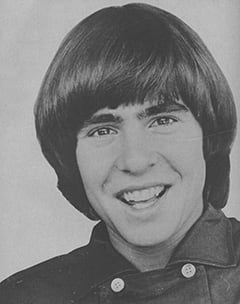
THE FINAL (AND MOST PRIVATE) PART OF DAVY’S VERY SPECIAL INTERVIEW WITH KEITH ALTHAM, FLIP’S LONDON EDITOR!
DAVY JONES TALKS ABOUT EVERYTHING THAT’S IMPORTANT TO HIM—AND TO YOU!
After Davy’s first visit to England shortly before the Monkees broke big in Britain with “I’m a Believer” several of the leading national newspapers carried quotes like Davy Jones says, “The Beatles are tired and on their way out!” Screams pierced the air as the Beatles’ loyal fans rushed to their heroes’ approach and to put Davy down.
Well, what was the truth? Did Davy really say those things about the Beatles? Was he getting too big for his boots (as one or two fans thought in letters to the British papers). To find out the answer I put the position to Davy straight from the shoulder during our chat at his hotel. (The first part of the interview was in last month’s FLIP.)
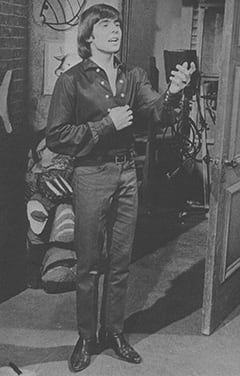
“Against the Beatles,” he laughed, “You must be joking. The Beatles are gods to us, man,” he continued. “I never said they were on their way out. All I said was that I thought they were tired—if I had had five years of the kind of work and exposure they’ve had I know I’d be tired.
“I’d never put a group like that down—oh listen, I’ve bought every album they’ve ever made and when I was in New York I hitched all the way to San Francisco and spent all my money just to see them in concert. Now does that sound as if I’m anti-Beatles.”
How does Davy feel about some of the harsh things which British pop stars like Paul Jones and Scott Walker have said about the Monkees, claiming that they are nothing more than puppets operated by Screen Gems and with little or no musical talent?
“I’ve never claimed to be a pop star,” said Davy. “I’m an actor and the public has made me a rock and roll singer—now I’m pleased about that. It’s bought me a lot of good things and I’m still new enough to all this success to enjoy the crowds, the autograph hunters and the adulation. Maybe when I’ve had it for as long as the Beatles—if I’m that lucky—then I’ll be tired too.
“If people here on the British pop scene really knew how hard we work on the set for those Monkee programs, they’d never put us down. Half the time we’re so tired that we’re on doctor’s shots to keep us going. All this didn’t come about overnight—there’s been a lot of hard work involved for us all.
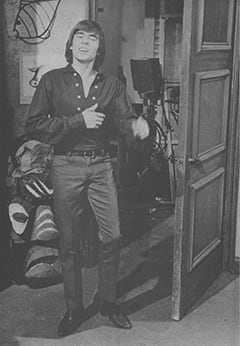
“I just want to make people happy and enjoy it. Now that’s not so bad, is it?”
I was most impressed by Davy’s refusal to reply to any of those attacks upon the Monkees by attacking the critics themselves. He has already realized that if you can’t say anything good about someone it’s better to say nothing at all.
“There are three things you are supposed to steer clear of in an interview,” he added cheekily, “Religion, politics and sex.” Having imposed his own barrier, he then proceeded to tear it down.
“See my badge.” He indicated the slogan on a little white disc that in Britain is known as a ‘barmy badge.’ It read simply “Jewish power.” “I’m sending away for another one which reads ‘Sterilise LBJ—no more ugly children.’”
I doubt very much whether either of these two slogans serve to indicate what kind of religious or political views Davy holds—they simply show that he has the natural, normal youthful impatience with the establishment and a strong dislike of prejudice in any form.
“Young people have become bored and confused by the established Church,” says Davy, “There are so many conflicting dogmas and religions all claiming that they are right and the other is wrong. Someone should make them put their heads together and come up with a new religion acceptable to all—how can one small section of the community claim to be all right and that the others are all wrong?
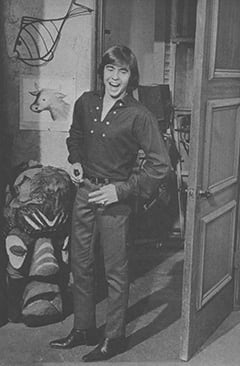
“I’m not an irreligious person—I read the Bible frequently, and it contains much truth and beauty. My mother read it to me a lot when I was a child.”
Davy is probably the Monkees’ most photographed member and he has been involved in some of the biggest fan receptions—some of them he admits terrify him.
“There was an occasion in Memphis that was the most frightening of all,” said Davy. “We were on our way out the rear of a hotel and we turned a corner to find ourselves confronted by about one hundred and fifty fans. We had three big strong bodyguards with us and the girls just trampled all over them.
“We dived out a back exit and into a subway which proved to be the year’s biggest mistake because we rounded a corner there to find hundreds of fans on the way to our concert.
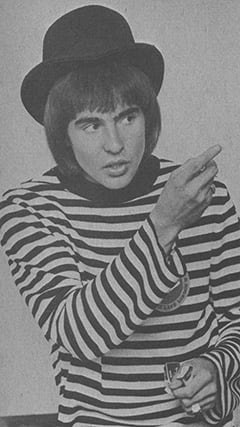
“There we are running down the main street pursued by several hundred fans who are driving us toward the stadium where there are approximately ten thousand more fans milling about outside who can’t get seats.
“Just as we were giving up hope two police cars drew up alongside and we found ourselves running between them. Then they opened the doors and let us jump in—that’s about the only time I’ve been really glad to see them.”
Although Davy admires much of the police work in the U.S. he has had some unfortunate first hand experience of being abused and seeing the tough methods employed on the West Coast with teenagers on Sunset Strip.
“I hate to see the kids getting a tough deal just because they are kids and have long hair,” said Davy, “And that kind of prejudice is just as immoral as any other and it does exist.”
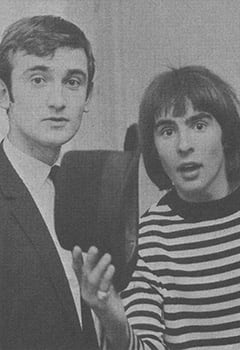
Davy believes that the gap between the worlds of the adult and the youth are wider in America than Britain.
“There’s a kind of mutual misunderstanding,” said Davy, “Somehow being a teenager in the U.S. is a long term thing because young people stay on longer at college.
“In England I was out earning a living for myself at sixteen and had left school—expected to be treated as an adult. In some states you’re lucky if they treat you as a human being if you have long hair and are riding a motor-bike.
“And don’t get the idea that all Americans are intolerant—I’ve got some good friends out there. The U.S. has been good to me and I’m grateful. But you can get brought down by the mentality which thinks you’re a moron if your hair is over your collar.”
Following all this more serious discussion I finally excused myself and on leaving Davy was back to being his energetic, frivolous self. But you’ve seen a flash of a deeper, serious, more sensitive person than some writers would have us believe Davy is. There are moments when even for a Monkee—the quipping has to stop!



